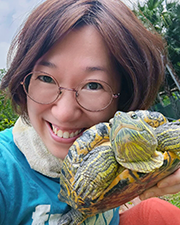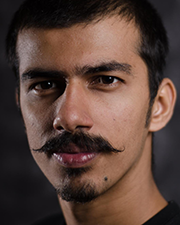
Mimi Lo @ MimiLOPADF (Mimi Lo Performing Arts Development Foundation) teaches contact improvisation at The Hong Kong Academy for Performing Arts. She is a graduate of The Hong Kong Academy for Performing Arts modern dance program, majoring in choreography and dance directing. Mimi followed Nancy Stark Smith in 2016 and 2018 to practice CI at EarthDance in the US and undertook the Long Dance Research project at The Dragon's Egg Studio, also in the US. She completed her DanceAbility® Teacher Training in Helsinki, Finland and her ContaKids Teacher training in Arezzo, Italy. Her current focuses are on contact improvisation and somatic dance and movement.
In the practice of contact improvisation, the application of momentum is generally emphasized. When you can master timing and make good use of momentum, your movements would become easier and more comfortable. But what if momentum is removed from the equation? Will you be able to better understand the different resources available to your body and find new possibilities? And then use them to dance in and out of momentum freely?

Maru is an inclusive dance facilitator, a postmodern dancer in improvisation, a live performance artist, and a dance sketcher. He participated in Nancy Stark Smith’s January Workshop in 2016 and 2018, and he was a part of her 2018 Long Dance project. In 2005, Maru encountered Alito Alessi’s DanceAbility Method, and he later completed his DanceAbility Teacher Certification in Bogota in 2012. Inspired by the DanceAbility Method, he began developing Symbiotic Dance in 2007, and with added inspiration from Nancy Stark Smith’s Underscore, he finalized what became known as the Symbiotic Score in 2015. In 2017, Maru completed his ContaKids Teacher Certification in Italy. Maru also makes kinesthetic sketches of dances and performances. His drawings have been featured in the Contact Quarterly journal, and he won first prize for a T-shirt design contest at Contact Festival Freiburg.

Sanat Mehta is a movement and a theatre practitioner, trained in jazz, ballet and modern contemporary, with a rich background in meditative and mind-body practices inspired by Buddhist, Advaita-Vedanta, Yogic, Javanese, and Taoist cultures and philosophies. In his pursuit to apply a holistic understanding of the living body towards his artistic development, he is currently studying and embodying contemporary theatre practices from the West and traditional theatrical practices from across Asia at the Intercultural Theatre Institute in Singapore. For the past few years, Sanat has been developing and sharing his knowledge of self-transformation through performing arts practices. He aims to create inclusive spaces, foster body-mind connections, and promote embodied empathetic language, while decolonizing minds along the way.
This workshop is designed to deepen our practice in contact and movement improvisation by focusing on the interconnected principles of flow, force, and time/speed. Through embodied investigation, we will cultivate awareness of the movement pathways our bodies create and the habitual patterns that shape our dancing. We will explore how to navigate moments that disrupt flow and discover creative strategies to maintain a continuous, responsive exchange with our partners. Rather than eliminating movement habits, the aim is to transform them into resources that enhance the dance’s momentum—while also remaining open to spontaneous shifts that invite new directions and possibilities in the shared dance.

